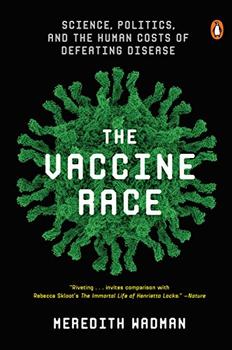Summary | Excerpt | Reviews | Beyond the Book | Readalikes | Genres & Themes | Author Bio

Critics' Opinion:
Readers' Opinion:
First Published:
Feb 2017, 448 pages
Paperback:
Sep 2018, 464 pages
 Book Reviewed by:
Book Reviewed by:
Zoë Fairtlough
Buy This Book
future—to try to understand why they did what they did.
The experiments began, in large part, during World War II.
They grew out of the exigencies of the war, when an ends justify the means mentality took over in U.S. medicine in the interest of keeping soldiers healthy at the front, because civilization was at stake. Everyone was expected to do their part for the cause—even institutionalized people with grave disadvantages or disabilities. When the war ended, the mentality didn't. In the two decades following the war and in several cases into the 1970s, medical researchers experimented on people—almost always vulnerable people—making them sick and sometimes killing them, in the full light of day.'
These scientists were perceived and perceived themselves as part of a heroic quest to defeat disease. They were ambitious, driven, and well funded by the U.S. government. And they got results.
During World War II and in the two decades following it, childhood mortality declined strikingly, in large part because of dramatic inroads against infectious diseases. Antibiotics that became available in the 1940s turned often lethal diseases like typhoid fever and dysentery into less grim maladies and slashed both the incidence of tuberculosis and its lethality. Vaccines against diphtheria, polio, and whooping cough hammered these childhood killers. Infectious diseases as a cause of death among children were rare by the middle of the 1960s.
The men who conducted unethical human experiments in this era were not medical outliers. They were top physicians and researchers operating with the full backing of the U.S. government, private funders, and esteemed medical schools and hospitals. Only in 1966, when a landmark paper in the New England Journal of Medicine exposed the harm being done to powerless people in scores of experiments, did the government begin to implement protections.
The surgeon general launched a requirement that people give their informed consent to participate in research studies funded by the U.S. government's health agencies and that researchers win preapproval for their human experiments from an independent committee charged with examining the risks and benefits to participants. Since then, those protections have been strengthened, expanded, and written into U.S. law. Today's system of human subject protections is not perfect. In fact, it has serious shortcomings and vocal critics. But it is worlds better than the feeble effort that existed half a century ago.
To remove the history of human exploitation from vaccines and medicines that were developed in the postwar era is impossible. The knowledge that allowed their development is woven into them. Should we therefore shun them? Definitely not. Take rubella as a case in point. As I write this in the summer of 2016, 1,700 babies in a dozen countries have been born with abnormally small heads or other brain malformations; their mothers were infected with the Zika virus while pregnant. Zika's emergence is a vivid reminder of what life was like in the United States in 1964. Then, there was no rubella vaccine and tens of thousands of American babies were born gravely damaged by the rubella virus, which selectively attacks fetuses in the womb. Like Zika, rubella homes in on the brains of fetuses; it also ravages their eyes, ears, and hearts. But today, thanks to the vaccine that was perfected in experiments on institutionalized orphans and intellectually disabled children, indigenous rubella has been wiped out in the Western Hemisphere. Cases occur only when they are imported from other countries.
We can't turn the clock back. The only way we can partially make it up to these children and untold others is to honor their contribution by making it meaningful—by continuing to vaccinate against rubella and the other diseases that made childhood a perilous journey before vaccines against them existed. We need also to strive constantly to enforce and improve the regulations and laws that protect research subjects so that in the future such abuses never happen again. We might also remember, when judging the men who abused vulnerable human beings in order to advance both human health and their own careers, that they were creatures of their time, just as we are of ours. Rather than training our criticism on them, it might be more useful to ask ourselves this: what are we doing or accepting or averting our glances from today that will cause our grandchildren to look at us and ask, How could you have let that happen?
Excerpted from The Vaccine Race by Meredith Wadman. Copyright © 2017 by Meredith Wadman. Excerpted by permission of Viking. All rights reserved. No part of this excerpt may be reproduced or reprinted without permission in writing from the publisher.





The House on Biscayne Bay
by Chanel Cleeton
As death stalks a gothic mansion in Miami, the lives of two women intertwine as the past and present collide.

The Flower Sisters
by Michelle Collins Anderson
From the new Fannie Flagg of the Ozarks, a richly-woven story of family, forgiveness, and reinvention.

The Funeral Cryer by Wenyan Lu
Debut novelist Wenyan Lu brings us this witty yet profound story about one woman's midlife reawakening in contemporary rural China.
Your guide toexceptional books
BookBrowse seeks out and recommends the best in contemporary fiction and nonfiction—books that not only engage and entertain but also deepen our understanding of ourselves and the world around us.